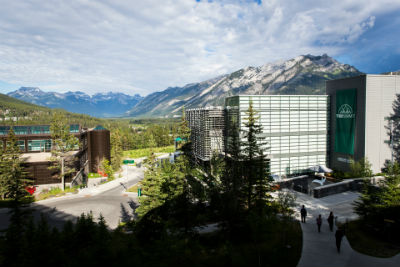
Oh, my TED head!
I’ve been home a week from the International TED Summit, and I’m only starting to recover. Add a 15-hour drive to each end of a several-day intellectual tsunami and—well, it was an adventure.
TED by the numbers: 6 days, 988 attendees from 60 countries, 50 talks, countless workshops. But the numbers don’t really capture the experience: instant new best friends from around the world, mountain hikes while brainstorming with TEDx organizers and TED speakers, bonding with gifted musicians from Kenya and Nigeria, and channeling Downton Abbey characters at dinner the final night at a castle.
As for that intellectual tsunami. I confess I’ve already forgotten some of the talks—not that they were forgettable, but I had a bad case of cognitive overload. I was happy to learn that I wasn’t alone—the intellectual and physical energy it takes to go from one highly stimulating event to another, for up to 16 hours a day, took its toll on us all. Another good reason they record these talks.
Luckily they’re already unrolling the talks on youtube and TED.com, and I plan to watch (almost) all of them again. In the meantime, here are a few speakers whose talks really changed me, and I want to share with you:
Alexander Betts, “Why Brexit Happened.” First of all, this guy wrote his talk in TWO DAYS, since Brexit happened just as the Summit got started. He delivered a brand-new, incredible, thoughtful talk without notes, while most of us were absorbing the event itself. He gets my standing ovation just for that. But he went much, much deeper than that. Since his talk is already available, I’ll stop here: just trust me, you really need to watch it.
https://www.ted.com/talks/alexander_betts_why_brexit_happened_and_what_to_do_next?language=en
Suzanne Simard, “The Secret Life of Trees.” She set out to “change the way you think about forests,” and wow, yes. My mouth hung embarrassingly open during her whole talk. She taught us what she’d discovered about inter-tree communication: trees actually converse with other, in the language of carbon, hormones and chemicals. Mother trees recognize their seedlings and send them extra nutrients. And when they’re dying, they send extra information to their kin so it’s not lost. Tolkien wasn’t far off when he wrote about Ents. Her talk’s not out yet, but here’s more in the TED blog: http://blog.ted.com/forest-for-the-trees-suzanne-simard-at-tedsummit/
Jennifer Brea’s talk on chronic fatigue syndrome made us all cry. And hold our breath. And cry some more. The energy and the courage it took for her even travel to the event, to sit in her wheelchair and share her story of devastating pain and misdiagnosis, affected us all. We waited, time and again, while she struggled to maintain her focus—these pauses were maybe the most powerful moments in her talk, as we cheered her on with silent applause, ASL style, out of respect for her extreme sensitivity to sound. You’ll really want to watch this one when it’s released! In the meantime, here’s more detail in this TED blog: http://blog.ted.com/the-story-of-a-baffling-illness-jen-brea-speaks-at-tedsummit/
One of the most powerful talks talk is one you’ll never get to see. Esra’a Al-Shafei delivered her talk on a dark stage, with all filming stopped, and we were strictly instructed to take no pictures. This young woman from Bahrain—despite the security risks to herself and her family—spoke with honesty and often hilarity (yes, it was the funniest talk we heard, aside from the actual comedian) about LGBTQ issues affecting Arab youth. I’m not sure I’ve ever witnessed bravery like hers.
I’ll be processing this experience for quite a while. And putting it to good use as we start working on TEDxBoise 2017 in the next few weeks. Meanwhile, it’s nice to be back home with my son, my four kitties and my garden. Oh, and plenty of naps.
